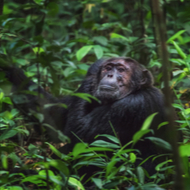RZSS announces support for UN conservation initiative

The RZSS has been working to protect Chimpanzees in Uganda.
On Saturday (5 June), the Royal Zoological Society of Scotland (RZSS) announced their support for the UN Decade on Ecosystem Restoration, to celebrate World Environment Day.
The UN Decade on Ecosystem, led by the United Nations Environment Programme (UNEP) and the Food and Agriculture Organization of the United Nations (FAO), aims to prevent the degradation of ecosystems, create an end to poverty, fight climate change and prevent a mass extinction.
The RZSS joins hundreds of fellow institutions in its support of the UN Decade on Ecosystem Restoration, all with the same goal of conserving and restoring the planet.
David Field, CEO of the Royal Zoological Society of Scotland, said: “Our planet is facing an extinction crisis, with scientists warning one million species are on the brink of disappearing and the evidence that human activities are behind nature’s rapid decline is overwhelming.”
“RZSS’s ground-breaking science and research continues to enable us to learn more about the incredible species in our care and informs measures to help safeguard species in the wild here in Scotland and beyond. Our education programme for schools has reached over one million young people in the past four decades with the aim to inspire the next generation of conservationists and reconnect them with nature.”
The RZSS has been safeguarding endangered and threatened species both in Scotland and around the world for over one hundred years, including current projects to restore the Scottish wildcat population, and protect chimpanzees in Uganda. The wildlife conservation charity is based at Edinburgh Zoo and Highland Wildlife Park, caring for almost 3,000 animals, and carrying out research at the forefront of conservation.
RZSS's support for the UN Decade on Ecosystem Restoration joins more than 250 institutions in 51 countries urging world leaders to take urgent measures towards ecological conservation at the CoP meeting of the UN Convention on Biological Diversity, which is going ahead in China this autumn.



 The veterinary mental health charity Vetlife is inviting the veterinary community to join it for a sponsored cold-water dip.
The veterinary mental health charity Vetlife is inviting the veterinary community to join it for a sponsored cold-water dip.